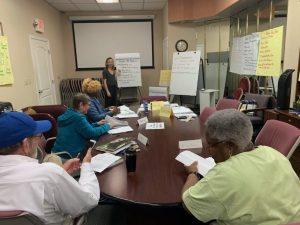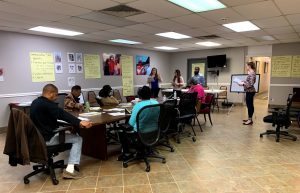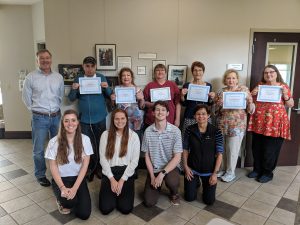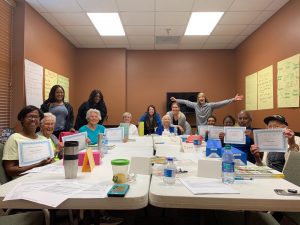Early in the 2019 spring semester, a group of our graduate students, faculty and staff completed the Chronic Disease Self-Management Program (CDSMP) Leader Training certification offered through our partnership with the Chattanooga-Hamilton County Health Department. A special thanks to our wonderful facilitators who led the four-day certification; Carleena Angwin, MFA, Public Health Educator at the Chattanooga-Hamilton County Health Department and Chelauna Sterling, MPH, Outreach Specialist at Primary Care and Hope Clinic in Murfreesboro, TN. This certification allows our students to deliver the CDSMP to community members across Chattanooga over the spring semester as a part of our Principles of Health Promotion & Communication Strategies experiential learning course.
The CDSMP is a free program offered to community members with chronic conditions or those that have a loved one with a chronic condition. The program is a series of six weekly, two-hour classes focusing on self-management techniques with the goal of helping participants live a healthier lifestyle. The main concepts included as a part of the CDSMP include:
- Mind-body connection and action planning
- Dealing with difficult emotions and communication skills
- Making decisions and managing pain & fatigue
- Healthy eating & physical activity
Dr. Elizabeth (Liz) Hathaway, instructor of the Principles of Health Promotion & Communication Strategies course, received a High-Impact Practices Development Grant from the UTC Walker Center for Teaching and Learning titled “Empowering Public Health Students to Impact the Chattanooga Community.” This grant allowed Dr. Hathaway to purchase course materials, healthy snacks, and completion gifts for participants at each CDSMP site. To augment their CDSMP training, Dr. Hathaway used the classroom setting to augment their CDSMP training with additional skills such as motivational interviewing, application of behavioral theories, and effective health communication principles. This training culminated with our students applying these skills in real world settings including:
- Delivery of an evidence-based program
- Creation of marketing materials for their target population
- Plan, organize, and establish a professional rapport with organization leaders
- Communication skills for facilitating sessions with community members of various age and racial ethnic groups


In groups of two to five, our students served as team leaders at six different sites around Chattanooga, delivering the CDSMP course in a multitude of diverse settings. The sites included Alexian, Bethlehem Center, Brainerd Baptist, Eastgate Senior Center, Jewish Federation, and Urban League.
“Our CDSM participants at Brainerd were mostly adults over the age of 60. One was a 96-year-old man, who may be slow but still mobile and full of spunk and wit. They were all close socially, and very active in each other’s lives. The CDSMP has opened my eyes to the importance for older adults to not only stay active physically but socially as well.” – Ashley Simmons
“I enjoyed working with seniors in our community and learning each of their stories. They were all very excited to share and work on tasks with the program and fun to work with as well. Over the course, we all connected as a group and were sad to part at the last session.” – Haleigh Dunning
“CDSMP has been an eye opening experience that has enhanced my compassion for underserved populations as well provided a genuine experience of working with individuals within the community.” – Hannah Marcum
Community participants also found the program beneficial. One participant, when asked how she felt after attending CDSMP, said she was feeling confident about dealing with emotional problems and continuing to make and follow action plans. Experiential learning experiences such as the CDSMP are an integral part of the Public Health program. As stated by Dr. Hathaway, “Our mission as Public Health faculty members is to engage students in applied experiences throughout their academic journey. This allows our students to utilize knowledge learned in the classroom in the real world setting while having an immediate, positive impact in the Chattanooga community. We have shining stars in our program; we certainly do not want to keep them in the classroom only.”

